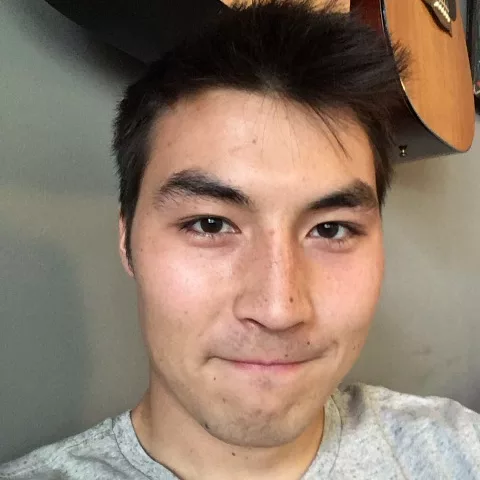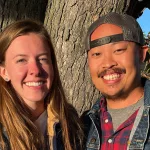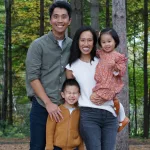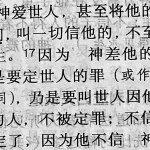As a mixed race person, my experience with understanding my own racial identity has forced me to uncomfortably exist between two sides. When interacting with either side of my heritage, it’s hard to not feel like an illegitimate misfit. Even now as I write this article, I wonder if it’s really my place to speak on the Asian American experience. I’m grateful that I was asked, and hopefully I can offer some insight. (If you’re reading this, Mike, thanks for thinking of me.)
I am of half Korean and half mixed European ancestry. My father is from a conservative Korean town called Gimcheon (or Kimcheon). My mother is a white girl from Wisconsin. To make things even more complicated, I was not raised by my biological parents. In fact, over the course of my life, I only lived with my parents for about a year. I was born into a foster home where I was led to believe that my German American foster parents were my biological parents. Essentially, I spent the first six years of my life thinking I was just white, completely oblivious to my Asian heritage. I don’t have time to explain all the details, but in short, at the age of 6, I very abruptly learned of my Asian heritage when my biological parents gained custody of me. Shortly thereafter, when my mom was no longer involved, my father took me to Korea. This was a very shocking experience for me. Only a few months prior, I was surrounded by white people in the Midwest, totally unaware that I was part Korean. Now I was in Korea, immersed in its culture, and surrounded by only Korean people.
Korea has always been very homogenous, but at that time, mixed Korean children were socially looked down upon. It didn’t help that I didn’t speak any Korean, and was completely ignorant of Korean social etiquette. There was a lot of judgment from my father’s friends, and my father didn’t completely disagree with them. In fact, when my mom became pregnant with me, my father had no intention of marrying her and having kids. His plan was to return to his hometown, marry a Korean woman, and have a traditional Korean family. My parents tried to terminate the pregnancy, but were unable due to a number of legal barriers.
After living in Korea for a few months, my father gave custody of me over to my mom’s brother. I came to live in Minneapolis when I was seven, and up to this point, I only had about a year of exposure to Korean and Asian culture. I lived in a white household, attended a large majority white church, and went to a school that was less than one percent Asian. I grew up surrounded by mostly white people, but after everything I had experienced before, I no longer felt like I belonged.
With all the interactions I’ve had regarding my own racial identity, I’ve often felt misunderstood and alienated. Growing up in the Midwest, people frequently reduced me down to just being Asian. I had a teacher in high school who even said to me in conversation, “Halley, you’re just Asian.” The irony that they were unaware of is that as a child living in Korea, my Korean elders and peers would say the opposite. It was painful for me because it disregarded the ways I had suffered for being, in a sense, simultaneously both and neither. I don’t believe these people intended to be hurtful. But their ignorance was hurtful and I didn’t feel welcome to help them learn.
Later in life, I took a trip to Los Angeles. I was walking along the beach when a stranger asked me if I was Hapa (a west coast term for half Asian). I was quite surprised. This was the first time someone got it right. It happened again multiple times during my trip. As I processed these interactions, it occurred to me that the way people have perceived me was a reflection of the culture and demographics of where they’re from. It wasn’t just about me. It was also about them and the people they grew up around.
As an adult, I’ve made more Asian American friends, and I learned a lot from them by hearing what their families were like growing up. I used to think that being only half Korean was what disappointed my father as a kid. I learned from their stories that this was common for first generation Asian-American parents. We would jokingly commiserate together how shame and disappointment seem to be core pillars of traditional Asian parenting. For the first time I had friends who I could talk to about having Asian heritage while culturally being fully American.
For much of my life, I’ve struggled with feeling too white to be accepted by Asian people and too Asian to be accepted by white people. As I’ve gotten older, I’ve come to terms with how I’m different, and have learned to not stake my identity on what people think about it. As a member of Christ’s body, I have acceptance with its members who are united by Jesus. My racial and cultural identity are further down on the list of things about me. I’m a child of God first. God has used my own experience, along with the joys and difficulties that came with it to make me more empathetic of the experiences of others.
There are a lot of stories and thoughts that I don’t have time to share, but I would like to end by offering a couple practical takeaways. First, our perception of other people is not entirely objective. It’s important to consider how our background might prevent us from seeing the entirety of someone else’s identity. Second, consider how race of ethnicity and race of culture are two separate things. One’s appearance may not match their cultural identity. There could be circumstances from their story that account for the disparity between the two aspects of their identity. Race and culture can be sensitive subjects for some people, but genuine and respectful curiosity is rarely punished. Hearing other people’s stories and learning from their experiences is a way to help them feel known. It promotes unity, and that benefits everyone.





